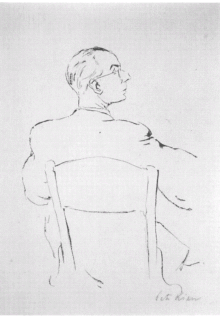Carlo Taube

Carlo Sigmund Taube (4 July 1897 – 3 October 1944) was a Czech Jewish pianist, composer and conductor.
Life[edit]
Carlo Taube was born in the region of Galicia on 4 July 1897. He studied music in Vienna with Ferruccio Busoni and earned a living by performing in cafes in Vienna, Brno and Prague. Taube, his wife Erika and their child were deported from Prague to the Terezín (Theresienstadt Ghetto) on 10 December 1941. In April 1942 he conducted the first orchestra performance in the Terezín Magdeburg caserne, premiering his own Terezín Symphony. Taube gave a number of solo concerts and conducted the Terezín band and orchestra. He also performed in the café. Carlo and Erika Taube and their child were deported to Auschwitz-Birkenau about 1 October 1944 (arriving Auschwitz 3 October 1944), where they were murdered.[1]
Works[edit]
Taube composed several pieces in Terezín in addition to the Terezín Symphony. These include:
- a Ghetto Lullaby (part of a Ghetto Suite for Alto and Orchestra),
- Poem, Caprice and Meditation, three short pieces for solo violin,
- Ein Jüdisches Kind (A Jewish Child), a lullaby for soprano and piano (the only work by Taube to survive World War II) – recorded by Anne Sofie von Otter
References[edit]
- ^ Karas, Joža (1990). Music in Terezín, 1941-1945. Pendragon Press. p. 127. ISBN 978-0-918728-34-0.
Sources[edit]
- Makarova, Elena, S. Makarov, V. Kuperman. University Over the Abyss. 2nd ed. Verba Publishers, Jerusalem, 2004.
- Karas, Joža. Music in Terezín, 1941-1945. 1st Ed. Beaufort Books Publishers, New York, 1985.
- Kuna, Milan. Hudba na hranici života (Engl: Music on the Boundary of Life). 1st ed. Naše vojsko/Český svaz protifašistických bojovníků, Prague, 1990.
External links[edit]
- 1897 births
- 1944 deaths
- Jews from Galicia (Eastern Europe)
- Austrian pianists
- Austrian male composers
- Austrian composers
- Austrian male conductors (music)
- Austrian Jews who died in the Holocaust
- Jewish composers
- Theresienstadt Ghetto prisoners
- Austrian civilians killed in World War II
- Austrian people who died in Auschwitz concentration camp
- 20th-century Austrian conductors (music)
- 20th-century Austrian male musicians
- 20th-century Austrian composers
- 20th-century pianists
- Austrian male pianists
